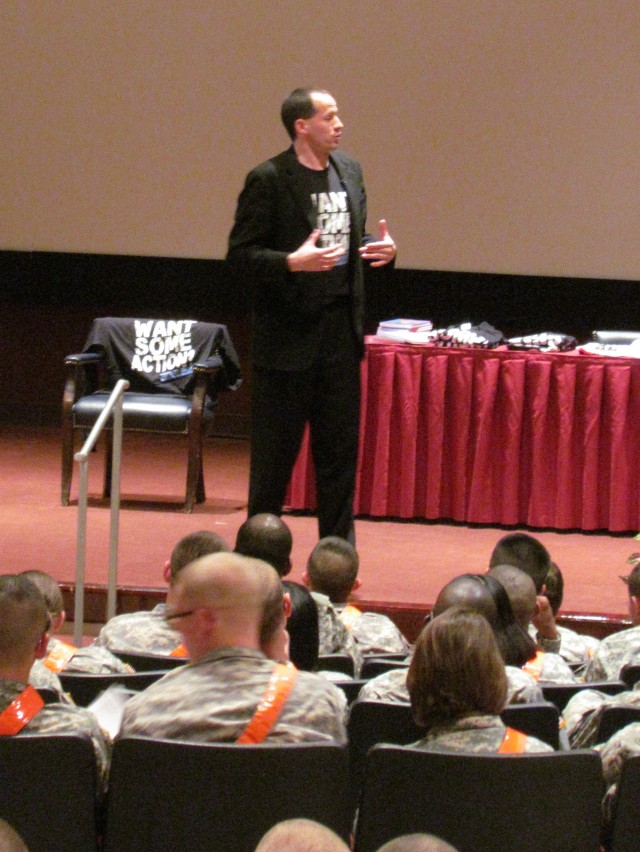
REDSTONE ARSENAL, Ala.--Can I kiss you'
To some, it's a laughable question when it comes to love and lust, but by the very definition of consent, classified by the dictionary as to give assent or approval, to agree, it is the first step in preventing a sexual assault.
"You have to understand that you have to ask," said Virginia Dempsey with Army Community Service, which provides sexual assault response and victim advocacy to sexual assault victims. "That person has the right to say yes, to say no, to think about it, to say maybe later or maybe not at all. If you don't specifically get a 'yes' then you don't touch someone's body, don't kiss or try to do anything that would make that other person feel uncomfortable. While we understand that intellectually, sometimes it's very hard when matters of the heart or emotions get involved and you start wanting to believe the other person is agreeing with your desires. You have to check first."
April is Sexual Assault Awareness Month in the United States, and the Army takes a special interest in not only putting a stop to sexual assault, but in making it everyone's responsibility to prevent it. In fiscal 2010, military services received 3,158 reports of sexual assault involving servicemembers, with 4.4 percent of active duty women and 0.9 percent of active duty men indicating they had received unwanted sexual contact within the past 12 months, according to the Department of Defense Annual Report on Sexual Assault in the Military, released in March. Amongst the greater United States population, an estimated 125,910 rape/sexual assaults were recorded in 2009, according to the National Crime Victimization Survey, released by the Bureau of Justice Statistics in October. More than 85 percent of sexual assaults are not reported, Dempsey said.
"We hope that victims who are suffering in silence will seek out help and at least be able to share their pain and get the support services they need," Dempsey said.
Help is available 24/7 for sexual assault victims on Redstone Arsenal, who may call Colleen Nicholson, sexual assault response/victim advocate coordinator with ACS at any time, day or night, at 508-6613. Once they establish contact with Nicholson, victims choose a location where they feel comfortable meeting to talk and go over their options. Victims have a choice in how they report the incident: restricted, which allows victims to disclose details of their assault, receive medical treatment, advocacy and counseling without beginning the official investigative process; or unrestricted, which reports the incident to law enforcement or the command, in addition to providing the victim with medical treatment, advocacy and counseling. For the first 24 to 48 hours, the Garrison allows victims to stay at an on-post hotel as they go through the interview process. Nicholson is allowed to work with the victim for as long as needed.
"It's important for them to know they're not alone and that they can talk to somebody that will assure them it's not their fault," Dempsey said. "Perpetrators, offenders, will often feel that they did not do anything wrong. Victims, on the other hand, take on all the responsibility. What we want to do is help the victims understand that it is not their responsibility. Their job is not to prevent the crime. The reality is that someone took advantage of them. Someone decided to offend them."
This year's theme for Sexual Assault Awareness Month -- "Hurts One. Affects All" -- speaks to the Army's efforts for everyone to become involved in putting a stop to sexual assault, through bystander intervention, which encourages Soldiers to intervene, act and motivate others to take action against sexual misconduct. Preventing sexual assault is considered everyone's duty.
"The Army believes that victims have rights," Dempsey said. "And also that bystanders have responsibilities to protect the victim from being assaulted and to protect the offender from causing harm and to do something that could be embarrassing or cost them their career."
The "I. A.M. STRONG" campaign encourages Soldiers to condemn acts of sexual harassment and put a stop to behavior that may lead to a sexual assault, denounce sexual misconduct and not engage in obscene gestures, language or behavior. Warning signs of an impending sexual assault include sexual harassment, pushing drinks on somebody or trying to isolate someone that has been drinking a lot, Dempsey said.
"It's no longer just about the offender - everyone has a responsibility," Dempsey said. "It's especially true with the buddy system in the Army. Buddies are there not to egg each other on. Intervening when there's a possible sexual assault not only prevents your buddy from committing a criminal offense, but from someone becoming a victim."
Mike Domitrz, founder and executive director of The Date Safe Project, visited the Arsenal April 13 to speak with Soldiers about being a battle buddy and helping each other prevent sexual assault in his program, "Can I Kiss You'" The program, designed to educate and entertain, brought plenty of laughs and interaction from the young Soldiers, all the while teaching them important lessons about consent, bystander intervention and supporting survivors of sexual assault.
In addition to presenting "Can I Kiss You'" to Soldiers on post, Domitrz also brought his show to Bob Jones High School in Madison. The population at the highest risk for becoming sexual assault victims or sexual assault perpetrators are between the ages of 14 and 24, according to Dempsey, making the program's availability to the middle school, high school, college and young Soldier age group all the more important.
"I don't think that young people understand, I don't know if they're mature enough to understand the dangers that are there, and that they can't do something just because they want to do something. They don't understand the rules of society," Dempsey said. "This is everything from taking pictures of their naked body for their boyfriend, sexting, to encouraging or forcing somebody to do something sexually that they're not prepared to do."
Dempsey encourages parents to help their children understand dating, and the importance of being responsible and respectful, of both other people and their own bodies.
"Sometimes young girls believe that it is their responsibility to take care of their boyfriends and not that it is the boyfriend's responsibility to take care of the girlfriend," Dempsey said. "I think our society has turned around to the point where young girls carry a lot of burden in terms of how they express themselves, what they need to do in order to be loved and to be a woman.
"Parents need to understand that children are making adult choices without fully understanding what they're doing, because while their bodies might be mature, they're still children. Their minds are not mature."
For more information about the Army Sexual Harassment/Assault Response & Prevention program, visit www.sexualassaultarmy.mil.

Social Sharing